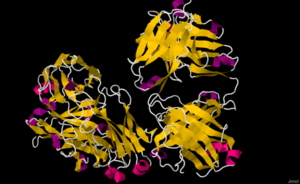The results of a randomized, controlled, multicentre, two-arm, parallel-group, double-blind study of CT-P10 (rituximab) in patients with rheumatoid arthritis has shown the equivalence, with respect to pharmacokinetics, efficacy and safety, of the biosimilar (CT-P10) and its reference product, Roche’s rheumatoid arthritis blockbuster MabThera/Rituxan (rituximab).
CT-P10 is a candidate biosimilar of Roche’s MabThera/Rituxan (rituximab), which is used not only in the treatment of rheumatoid arthritis, but also leukaemia and non-Hodgkin’s lymphoma, a group of cancers arising from lymphocytes or white blood cells.
South Korean biotechnology company Celltrion presented the results of the studies at the 2013 American College of Rheumatology (ACR)/Association of Rheumatology Health Professionals (ARHP) Annual Meeting in San Diego, USA, which was held on 26–30 October 2013 [1].
The phase I trial of the monoclonal antibody biosimilar was carried out in 154 patients with active rheumatoid arthritis who did not respond to TNF-α inhibitors over 24 weeks. Participants were randomized 2:1 to receive two 1,000 mg intravenous infusions of either CT-P10 (n = 103) or MabThera (n = 51) with a two-week interval between infusions, co-administered with weekly methotrexate and folic acid.
The ratios (%) of the geometric means of the area under the serum concentration-time curve from time ‘0’ to time of last quantifiable concentration (AUC0–last) and maximum serum concentration (Cmax) between the CT-P10 and MabThera groups were 98.3% (90% CI: 89.6, 107.8) and 97.6% (90% CI: 92.0, 103.5), respectively. These results fell within the predefined equivalence limits of 80–125%.
The geometric mean AUCs for B-cell counts, a comparative pharmacodynamic parameter, was 20.8 cells/µL for the CT-P10 group and 20.4 cells/µL for the MabThera group. The ratio (%) of the geometric means of the AUC for B-cell count was 102% (90% CI: 98, 106).
ACR20/50/70 response rates at week 24 were 63.0%/37.0%/16.0% in the CT-P10 group and 66.7%/31.3%/14.6% in the MabThera group. The proportion of patients who had a moderate or good response at week 24 were 76.8% and 79.1% for European League Against Rheumatism (EULAR)-ESR response and 82.1% and 83.7% for EULAR-CRP response in the CT-P10 and MabThera groups, respectively.
The proportion of patients who developed anti-drug antibodies during the study was similar in both treatment groups at week 24 [CT-P10: 17.6% (18/102) and MabThera: 17.6% (9/51)]. The safety profile for CT-P10 and MabThera were also comparable at week 24; serious adverse events were reported in 16.7% of CT-P10 and 17.6% of MabThera patients.
Celltrion therefore concluded that CT-P10 and MabThera were equivalent in terms of AUC0–last and Cmax in patients with active rheumatoid arthritis. Clinical efficacy for ACR20/50/70 and EULAR response rates and pharmacodynamics for B-cell kinetics were comparable between the two treatment groups. CT-P10 was well tolerated with a safety profile comparable to that of RTX up to week 24.
Related articles
Open-label studies show similarity of biosimilar infliximab and Remicade
Trials of biosimilar monoclonal antibody prove biosimilarity
Reference
1. Yoo DH. A Randomized, Controlled, Multicenter, 2‑Arm, Parallel‑Group, Double-Blind Study To Demonstrate The Equivalence Of CT-P10 To Innovator Rituximab With Respect To Pharmacokinetic Profile In Patients With Rheumatoid Arthritis. American College of Rheumatology (ACR)/Association of Rheumatology Health Professionals (ARHP) Annual Meeting, San Diego, US, 26–30 October 2013. Abstract:#1736.
Permission granted to reproduce for personal and non-commercial use only. All other reproduction, copy or reprinting of all or part of any ‘Content’ found on this website is strictly prohibited without the prior consent of the publisher. Contact the publisher to obtain permission before redistributing.
Copyright – Unless otherwise stated all contents of this website are © 2013 Pro Pharma Communications International. All Rights Reserved.








 0
0











Post your comment